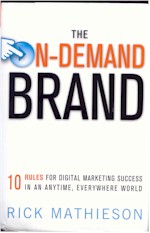 |
|
|
| ||||||
|
|
This page is the original source of this review, though you may also find it on Amazon or other sites. | ||
| Book Reviews Home | Free Audio Books | |
 |
Book Review of: The On-Demand Brand10 rules for digital marketing success in an anytime, everywhere world Price: $16.47 Availability: Usually ships
within 24 hours |
| Review
of
The On-Demand Brand, by Rick Mathieson (Hardcover, 2010) (You can print this review in landscape mode, if you want a hardcopy) Reviewer: Mark Lamendola, author of over 6,000 articles. This book is 259 pages long, and consists of 10 chapters. Each chapter addresses one rule of media buying or advertising strategization. This book isn't a marketing text. There's no number crunching and there aren't any product development research case studies. The book focuses advertising rather than on marketing. The subtitle is reflective of the book's contents, only if you change "marketing" to "advertising." The two are related, but not the same. This book's target audience is the media buyer or advertising director of a corporation that's large enough to run television ads. Many of the references were to television shows, television ads, television celebrities, and television culture. As I don't watch television, I sometimes had no clue who or what the author was talking about. However, even without an understanding of the specific examples, I was able to understand some important points the author made.
The author helps dispel some of the "great ideas" that have cost companies fortunes in wasted resources. The waste is often due to poor execution of a flawed strategy. Many companies just plain get off track, wasting their ad budget on "marketing" efforts that were undertaken without a clear purpose in mind. If you work in advertising at a major corporation, you may very well save a few dozen jobs there by helping your company invest in high ROI advertising instead of just wasting ad budget dollars on someone's idea of "we need to....". This book will help you gain insights toward achieving that. I think the basic premise of this book is that if you are a media buyer or advertising strategist, you need to look at each medium as a separate advertising space with its own rules. And once you do that, you won't make the mistake of trying to replicate essentially the same ad on each medium. In fact, the advertising opportunities offered by mobile devices (which the book addresses extensively) have such starkly different characteristics from those of other media that you need to strategize your mobile campaign from scratch. There is little, if any, crossover, with other media Unfortunately, most companies "doing digital" are treating the various media as similar and just "repurposing" ad content from one medium to another. This results in colossal wastes of money and advertising opportunities. I normally disparage a book that doesn't include a stout bibliography as evidence it was well-researched. This book doesn't need a bibliography as proof it was well-researched. It taps primary sources (in researcher parlance, a primary source is the best possible source), placing their interviews directly into the text. In fact, you'll see entire chapters consist almost exclusively of an interview with an expert. So, this book isn't some rubber chicken circuit person's "book me for your next event" promo fluff piece. It's really an advertising industry expert providing insights of various experts who are getting results in the real world. | |
About these reviewsYou may be wondering why the reviews here are any different from the hundreds of "reviews" posted online. Notice the quotation marks? I've been reviewing books for sites like Amazon for many years now, and it dismays me that Amazon found it necessary to post a minimum word count for reviews. It further dismays me that it's only 20 words. If that's all you have to say about a book, why bother? And why waste everyone else's time with such drivel? As a reader of such reviews, I feel like I am being told that I do not matter. The flippancy of people who write these terse "reviews" is insulting to the authors also, I would suspect. This sound bite blathering taking the place of any actual communication is increasingly a problem in our mindless, blog-posting Webosphere. Sadly, Google rewards such pointlessness as "content" so we just get more if this inanity. My reviews, contrary to current (non) standards, actually tell you about the book. I always got an "A" on a book review I did as a kid (that's how I remember it anyhow, and it's my story so I'm sticking to it). A book review contains certain elements and has a logical structure. It informs the reader about the book. A book review may also tell the reader whether the reviewer liked it, but revealing a reviewer's personal taste is not necessary for an informative book review. About your reviewer
About reading styleNo, I do not "speed read" through these. That said, I do read at a fast rate. But, in contrast to speed reading, I read everything when I read a book for review. Speed reading is a specialized type of reading that requires skipping text as you go. Using this technique, I've been able to consistently "max out" a speed reading machine at 2080 words per minute with 80% comprehension. This method is great if you are out to show how fast you can read. But I didn't use it in graduate school and I don't use it now. I think it takes the joy out of reading, and that pleasure is a big part of why I read. |
| |||||